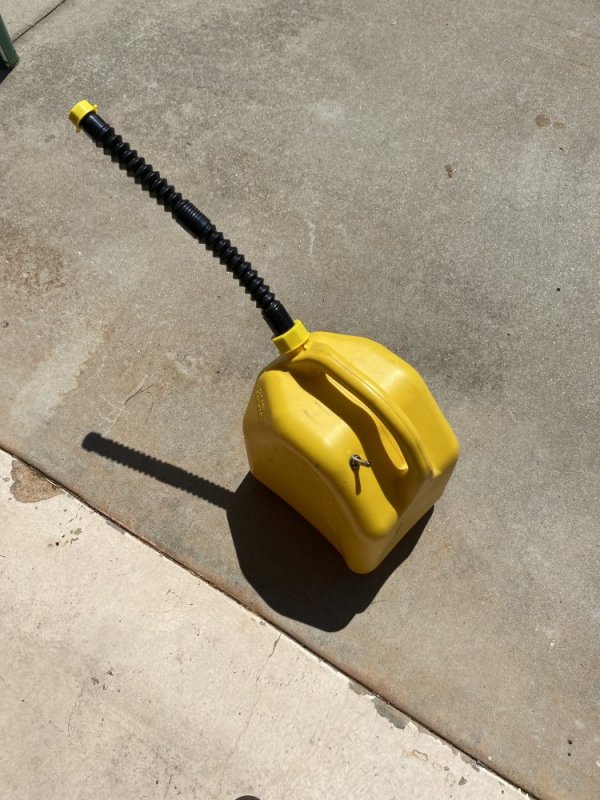schiker
Well-Known Member
Anyone rinse their jugs out and try to store them dry?
I have maybe (8) plastic fuel jugs. I have tops for them and never leave the tops off for long.
Before getting fuel I look inside and if they are "dirty" I clean them with carb cleaner and gasoline before getting fuel. When I say dirty they are stained and little brown flakes that I assume are maybe algae/fungus but are probably parts of residual fuel that have oxidized?
I am going to quit using the NO-spill diesel jugs because they get the most "stained" in the bottom. They are made of HDPE No. 2. The older Blitz jugs are a bit better No 4 plastic I will limit their use.
I have a Scepter No. 2 plastic that stays cleaner than blitz but its newer.
My newest jugs are Midwest brand No. 7 plastic ? They clean the easiest but still get some crud.
Yesterday I had to get some fuel and I thought let me try to rinse the cans out afterward with a little non-ethanol stabilized gas to rinse out any diesel and moisture before sealing them back up. Wonder if that will help them stay "clean" ?
I do add Stabil for diesel and Powerservice bio Kleen. Wish there was something that wasn't so concentrated for treating 5 gal jugs. Both say not to over treat so I just pour a litte in each jug approx 1/8-1/4 oz and some brand of fuel treatment to improve cetane and add lubricity.
If my jugs sit and get a decent test I'll try and report back. Just wondering if you dry your diesel jugs?
I have had my '72 Ford tractor ~ 25 years and it still runs fine no stoppage due to fuel algae problems. My ' 08 deere I have had for ~ 9 years. It has a plastic fuel tank. I have had no fuel issues yet but I do worry more about that one
I have maybe (8) plastic fuel jugs. I have tops for them and never leave the tops off for long.
Before getting fuel I look inside and if they are "dirty" I clean them with carb cleaner and gasoline before getting fuel. When I say dirty they are stained and little brown flakes that I assume are maybe algae/fungus but are probably parts of residual fuel that have oxidized?
I am going to quit using the NO-spill diesel jugs because they get the most "stained" in the bottom. They are made of HDPE No. 2. The older Blitz jugs are a bit better No 4 plastic I will limit their use.
I have a Scepter No. 2 plastic that stays cleaner than blitz but its newer.
My newest jugs are Midwest brand No. 7 plastic ? They clean the easiest but still get some crud.
Yesterday I had to get some fuel and I thought let me try to rinse the cans out afterward with a little non-ethanol stabilized gas to rinse out any diesel and moisture before sealing them back up. Wonder if that will help them stay "clean" ?
I do add Stabil for diesel and Powerservice bio Kleen. Wish there was something that wasn't so concentrated for treating 5 gal jugs. Both say not to over treat so I just pour a litte in each jug approx 1/8-1/4 oz and some brand of fuel treatment to improve cetane and add lubricity.
If my jugs sit and get a decent test I'll try and report back. Just wondering if you dry your diesel jugs?
I have had my '72 Ford tractor ~ 25 years and it still runs fine no stoppage due to fuel algae problems. My ' 08 deere I have had for ~ 9 years. It has a plastic fuel tank. I have had no fuel issues yet but I do worry more about that one

